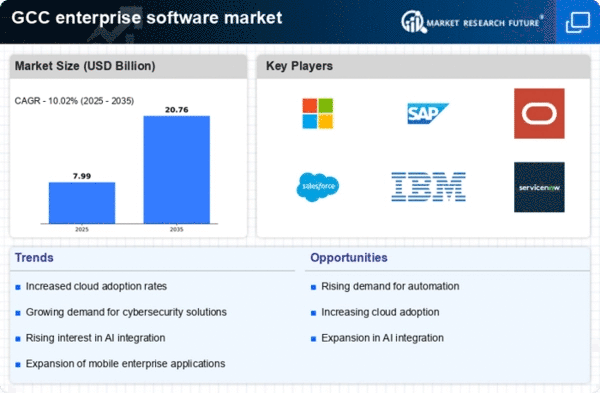Digital Transformation Initiatives
The ongoing digital transformation initiatives across various sectors in the GCC are driving the enterprise software market. Organizations are increasingly adopting advanced technologies to enhance operational efficiency and customer engagement. According to recent data, the GCC region is expected to witness a growth rate of approximately 15% in digital transformation spending by 2026. This shift towards digital solutions necessitates the integration of enterprise software to streamline processes and improve data management. As businesses seek to remain competitive, the demand for innovative software solutions that facilitate digital transformation is likely to rise, thereby propelling the enterprise software market.
Regulatory Compliance Requirements
The stringent regulatory compliance requirements in the GCC are significantly influencing the enterprise software market. Governments in the region are implementing various regulations aimed at enhancing data protection and privacy. For instance, the introduction of data protection laws necessitates organizations to adopt software solutions that ensure compliance. This has led to an increased demand for enterprise software that can assist in managing compliance-related tasks efficiently. It is estimated that compliance-related software solutions could account for up to 20% of the total enterprise software market by 2025, reflecting the critical role of regulatory frameworks in shaping market dynamics.
Shift Towards Remote Work Solutions
The shift towards remote work solutions is significantly impacting the enterprise software market in the GCC. As organizations adapt to new work environments, there is an increasing need for software that supports remote collaboration and productivity. This trend has led to a rise in demand for cloud-based enterprise software solutions that facilitate communication and project management. It is estimated that the market for remote work software could grow by 25% in the next few years, reflecting the changing dynamics of the workplace. Consequently, the enterprise software market is likely to evolve to accommodate these new requirements, emphasizing flexibility and accessibility.
Increased Investment in IT Infrastructure
The GCC countries are witnessing a surge in investment in IT infrastructure, which is a key driver for the enterprise software market. Governments and private sectors are allocating substantial budgets to enhance their technological capabilities. For example, the UAE has announced plans to invest over $1 billion in IT infrastructure development by 2025. This investment is likely to create a favorable environment for the adoption of enterprise software solutions, as organizations seek to leverage advanced technologies to improve productivity and operational efficiency. Consequently, the enterprise software market is expected to benefit from this influx of capital and infrastructure development.
Growing Demand for Data Analytics Solutions
The growing demand for data analytics solutions in the GCC is reshaping the enterprise software market. Organizations are increasingly recognizing the value of data-driven decision-making, leading to a surge in the adoption of analytics software. Recent studies indicate that the analytics software segment is projected to grow by 18% annually in the region. This trend is driven by the need for businesses to gain insights from vast amounts of data to enhance performance and competitiveness. As a result, the enterprise software market is likely to expand, with a focus on providing robust analytics capabilities to meet the evolving needs of organizations.
















